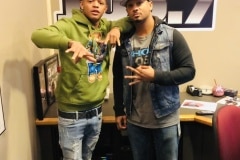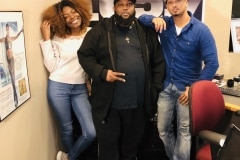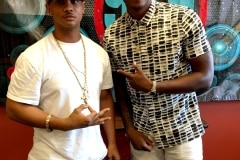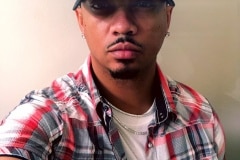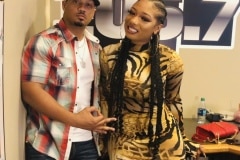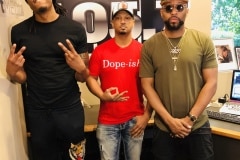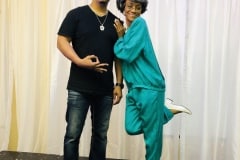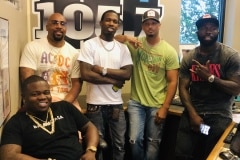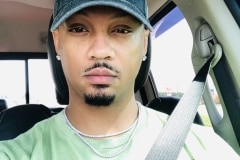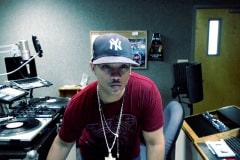
Getty Images
For too long, many people — including musicians — have silently battled mental health issues, putting on a happy face for the rest of the world.
But things have been changing. In recent years, many artists from across multiple genres have used their platforms to speak out in the hopes of destigmatizing everything from depression to bipolar disorder and more by opening up about their own struggles and methods for coping.
Adele and Alanis Morissette, for example, have shared their experiences with postpartum depression. Billie Eilish has opened up about how fame led to depression and suicidal ideation, while Bebe Rexha and Halsey have shared their bioplar disorder diagnoses. Guns N’ Roses rocker Duff McKagan, who battles panic disorder, revealed that a new song was written in the midst of a panic attack, while Rick Springfield recalled a past suicide attempt in his memoir.
These are just some of the brave artists who have shared their experiences to encourage the millions of fans who are listening to them. Read on for more musicians who have opened up about their mental health journeys.
May is Mental Health Awareness Month. If you or anyone you know is struggling with mental health or substance abuse disorders, reach out to the Substance Abuse and Mental Health Services Administration‘s national helpline 24/7 at 1-800-662-HELP (4357) for confidential treatment referrals and information. For those who are experiencing suicidal thoughts and/or distress, the National Suicide Prevention Lifeline is available 24/7 at 1-800-273-8255. You can also call or text 988 to get connected to trained counselors.
-
Adele
The Grammy-winning singer opened up about her postpartum depression in a 2016 Vanity Fair cover story when she explained why she was hesitant to have another child after welcoming son Angelo. “I’m too scared. I had really bad postpartum depression after I had my son, and it frightened me,” she said, noting that she did not take antidepressants.
“My knowledge of postpartum — or post-natal, as we call it in England — is that you don’t want to be with your child; you’re worried you might hurt your child; you’re worried you weren’t doing a good job. But I was obsessed with my child. I felt very inadequate; I felt like I’d made the worst decision of my life. … It can come in many different forms.”
-
Alanis Morissette
After welcoming her third child in 2019, the singer opened up about her struggle with postpartum depression in a post on her website. “I wasn’t sure if I would have post partum depression/anxiety this time around. Or, as I like to call it: post partum activity. Or, also: post partum tar-drenched trenches,” she wrote.
“Hormonal. Sleep deprivation. Fogginess. Physical pain. Isolation. Anxiety. Cortisol. Recovery from childbirth (as beautiful and intense as mine was at home, dream birth.), integrating new angel baby with older angel babies. Marriage. All kinds of PTSD triggers. … PPD is still a sneaky monkey with a machete.”
-
Ariana Grande
“I know those families and my fans, and everyone there experienced a tremendous amount of it as well. Time is the biggest thing. I feel like I shouldn’t even be talking about my own experience — like I shouldn’t even say anything. I don’t think I’ll ever know how to talk about it and not cry,” the pop star told British Vogue about suffering from PTSD after more than 20 people were killed in a bombing during one of her 2017 shows. “I’ve always had anxiety. I’ve never really spoken about it because I thought everyone had it, but when I got home from tour it was the most severe I think it’s ever been.”
Grande also spoke out May 2, 2021, in the hopes of ending the stigma surrounding mental health. “Here’s to ending the stigma around mental health and normalizing asking for help,” Grande captioned a mini gallery of text slides, which included numerous resources. “Healing isn’t linear, fun, quick or at all easy but we are here and we’ve got to commit to making this time as healthy, peaceful and beautiful as possible. the work is so hard but we are capable and worth it. sending so much love and strength.”
-
Bebe Rexha
The singer told her fans via social media in 2019 that she had been diagnosed with bipolar disorder. “For the longest time, I didn’t understand why I felt so sick. Why I felt lows that made me not want to leave my house or be around people and why I felt highs that wouldn’t let me sleep, wouldn’t let me stop working or creating music. Now I know why,” she wrote. “Honesty is a form of self love.”
-
Becky G
The singer-actress shared how touring was impacting her mental health in May 2019. “This year I became extremely aware of how much traveling f–ks my body,” she shared in her Instagram Stories. “The results from it all have been low blood circulation, muscle cramps, dehydration, anxiety and uncomfortable inflammation in certain areas of my body. I found my mental headspace becoming harder and harder to control with a schedule that is inconsistent with a healthy sleep schedule and time to decompress.”
The “Mamiii” singer went on to share some of the things she’s done to improve her mental well-being, which included journaling and stretching.
-
Big Sean
The “Bounce Back” rapper nixed a North American tour in 2018, and later told Billboard it was a good move for him personally. “I never really took the time out to nurture myself, to take care of myself. It took me a lot of depression having a lot of anxiety to realize something was off,” he said. “I’ve been getting myself together, getting my mind right. So I have been taking better care of myself.”
-
Billie Eilish
The young superstar might be on top of the world professionally, but her newfound fame led to depression and suicidal thoughts, she told Gayle King ahead of the 2020 Grammy Awards. “I was so unhappy last year … I was so unhappy and I was so, like, joyless. I didn’t ever think I would be happy again, ever,” she said. “I don’t want to be too dark, but I genuinely didn’t think I would, like, make it to, like, 17.”
-
Bruce Springsteen
The musician shared with Esquire in 2018 that he had struggled with mental health issues, and how he’d had two emotional breakdowns. “I have come close enough to [mental illness] where I know I am not completely well myself,” said Springsteen, who also noted that his father was diagnosed with paranoid schizophrenia later in life.
“I’ve had to deal with a lot of it over the years, and I’m on a variety of medications that keep me on an even keel; otherwise I can swing rather dramatically and … just … the wheels can come off a little bit. So we have to watch, in our family. I have to watch my kids, and I’ve been lucky there. It ran in my family going way before my dad.”
-
Camila Cabello
“OCD is weird. I laugh about it now. … Everybody has different ways of handling stress. And, for me, if I get really stressed about something, I’ll start to have the same thought over and over again, and no matter how many times I get to the resolution, I feel like something bad is about to happen if I don’t keep thinking about it,” she told Cosmopolitan U.K. in 2018. “When I found out, and [learned] how to step back from it, it made me feel so much better. I feel so much more in control of it now.”
-
Charli XCX
While promoting her self-titled third album in 2019, the singer-songwriter opened up about her mental health. “[I go into] my thoughts and feelings about my mental state and what life is supposed to be as an artist, my depression, and my insecurities,” she told SPIN about using her music to candidly explore her mental health, and how that has impacted her record. “I’m being more honest than ever before. It’s been very therapeutic.”
-
Demi Lovato
Lovato revealed in a 2011 interview with Robin Roberts that she — then 18 years old — had been diagnosed with bipolar disorder. “I had no idea that I was even bipolar until I went into treatment,” she said. “I was actually manic a lot of the times that I would take on workloads, and I would say, ‘Yes, I can do this, I can do this, I can do this.’ I was conquering the world, but then I would come crashing down, and I would be more depressed than ever.”
In her 2021 docuseries Dancing With the Devil, the singer shared that she had been misdiagnosed. “I came out to the public when I found out I was bipolar because I thought that it put a reasoning behind my actions,” she explained in the four-part YouTube Originals series. “I know now from multiple different doctors that it was not because I was bipolar.”
In addition to sharing her experiences, Lovato has used her platform to bring awareness to mental health issues by speaking with legislators on behalf of the Be Vocal: Speak Up About Mental Health initiative, and executive produced the 2017 documentary Beyond Silence, about three people’s experiences with mental illnesses.
-
Dove Cameron
After finding major success with her LGBTQ pop anthem “Boyfriend,” Cameron found that she and her sexual identity were suddenly under a very bright spotlight. As happy as she was for all the positive feedback on the song, she also revealed that she had been experiencing depression and dysphoria in trying to reconcile her public image with her private identity.
“Sexuality and performative gender norms, societal rewards and identity are really throwing me for a loop,” she wrote in an in-depth May 2022 Instagram post. “Social media and mirrors and branding and the constant broadcasting of self and visibility of ourselves and everyone everywhere is not optimal for mental health, clarity of energy or relationship to our inner world. For any of us.”
-
Duff McKagan
The Guns N’ Roses bassist released a new tune titled “This Is the Song” on May 10, 2023, to mark Mental Health Awareness Month. In an open letter to fans posted on his website, the rocker shared that he has “dealt with a certain variety of panic disorder” since he was 16. He added that with the global coronavirus pandemic, it had changed. “My panic disorder has morphed and twisted and brought along some darkness that seems to appear out of absolutely nowhere,” he wrote. “It can be terrifying.”
“‘This Is the Song’ was written in the middle of a panic attack,” he revealed in his message to fans. “I couldn’t breathe and couldn’t see straight, and lately, I have thankfully found my acoustic guitar as a refuge. If I just hold on to that guitar, play chords and hum melodies, I can start to climb my way out of that hole. For those of you who have never experienced something like this, count yourselves blessed. To those of you who recognize what I am talking about: YOU ARE NOT ALONE!”
-
Ed Sheeran
“I have social anxiety. I hate large groups of people, which is ironic, because I play shows for a living,” Sheeran told Charlamagne the God in a 2019 interview. “But I just feel claustrophobic and don’t like being around too many people.”
The pop star also called his emotional 2023 docuseries The Sum of It All “a snapshot of grief and mental health and depression” during a May screening in New York City.
-
Elle King
The musician shared in a now-deleted 2017 Instagram post that she was suffering from PTSD and depression. A year later, after her marriage fell apart, she told People that she sought help from a specialist. “If I didn’t get help, I probably wouldn’t be … I don’t know. I don’t wanna think like that,” she said. “I think that reaching out saved my life. I don’t wanna think of any other outcome that could have happened. I feel like the more I talk about it, maybe it could reach somebody … reach somebody that feels alone.”
-
Ellie Goulding
“I started having panic attacks, and the scariest part was it could be triggered by anything. I used to cover my face with a pillow whenever I had to walk outside from the car to the studio. My new life as a pop star certainly wasn’t as glamorous as all my friends from home thought. Secretly, I was really struggling physically and emotionally,” the singer told Well + Good in 2017. “I still feel nervous before performing, or have pangs of anxiety from time to time, but it’s not crippling like it used to be.”
-
Halsey
The artist shared in Billboard’s March 2016 cover story that she was diagnosed with bipolar disorder while in high school, and spent weeks in a psychiatric hospital her senior year. “I had tried to kill myself,” said Halsey, who is also a mental health advocate. “I was an adolescent; I didn’t know what I was doing. Because I was 17, I was still in a children’s ward, which was terrifying.”
In May 2020, the “I Am Not a Woman, I’m a God” singer participated in YouTube’s Artist Spotlight Stories, during which she did a deep dive with Dr. Snehi Kapur for Mental Health Awareness Month. During the discussion, the Grammy nominee also shared her mantra: “Achieving mental health doesn’t happen. Mental health isn’t a destination. You never arrive at mental healthy and go, ‘OK, I’m glad I got here.’”
She has also been outspoken for people to be more understanding of those who struggle with mental health issues. In July 2020, she tweeted: “I have dedicated my career to offering education and insight about bipolar disorder and I’m so disturbed by what I’m seeing. Personal opinions about someone aside, a manic episode isnt a joke. If you can’t offer understanding or sympathy, offer your silence.”
-
James Blake
“It’s especially easy to poke fun at the idea that a white man could be depressed. I have done it myself, as a straight white man who was depressed. In fact, I still carry the shame of having been a straight white man who’s depressed and has experienced suicidal thoughts,” the artist wrote in an essay in It’s Not OK to Feel Blue (and Other Lies). “I also believe everybody is entitled to pain, no matter how perceptibly or relatively small that pain is. I don’t want the shame around depression and anxiety in privileged people to become worse any more than I want it for the marginalized.”
-
Janet Jackson
“I struggled with depression. The struggle was intense … Low self-esteem might be rooted in childhood feelings of inferiority. It could relate to failing to meet impossibly high standards. And of course there are always the societal issues of racism and sexism,” the Grammy winner wrote in a 2018 issue of Essence. “Put it all together and depression is a tenacious and scary condition. Thankfully, I found my way through it.”
-
Jesy Nelson
The former Little Mix singer opened up about the toll being in the popular group took on her mental health in a May 2021 interview with Cosmopolitan U.K. She shared that suffered from anxiety, and was constantly worried about her weight due to being considered the heavy one of the quartet. The “breaking point” for her came on the day they filmed their “Sweet Melody” video, when she was struck by a panic attack, and realized then that she had to leave the group for her own well being. Nelson said of her time with Little Mix: “I can’t believe how miserable I was.”
-
Joe Jonas
Jonas shared during an interview with CBS This Morning on May 4, 2021, that he and wife Sophie Turner were working on developing a mental health foundation during the global coronavirus pandemic, which has been a difficult time for many. “For us, we’ve noticed how much just in the last year, year and a half, it’s taken a toll on a lot of different people,” he shared, noting that he took time to meditate and “[speak] to a therapist.” Mental health struggles are not new for the couple. The Game of Thrones actress has previously opened up about her struggles with depression, and how her husband helped her battle them.
-
Julie Andrews
The celebrated star told Stephen Colbert in 2019 while promoting her memoir Home Work that she first sought therapy after she and Blake Edwards, her first husband, separated. “My head was so full of clutter and garbage,” she shared. “Believe it or not, it was [director] Mike Nichols who really tipped me into wanting to go to therapy because … he was so sane and so funny and clear. He had a clarity that I admired so much, and I wanted that for myself and I didn’t feel I had it. So I went and got into it, and it saved my life in a way.”
She later added about therapy: “These days, there’s no harm in sharing it. I think everybody knows the great work it can do. Anybody that is lucky enough to have it, afford it and take advantage of it, I think it would be wonderful.”
-
Justin Bieber
The “Sorry” singer was contrite in a lengthy 2019 Instagram message to his fans, apologizing for his wrongdoings. But he was also honest about his struggle with depression. “It’s hard to get out of bed in the morning … when it feels like there’s trouble after trouble after trouble,” he wrote. “You start foreseeing the day through lenses of ‘dread’ and anticipate another bad day. A cycle of feeling disappointment after disappointment. Sometimes it can even get to the point where you don’t even want to live anymore. Where you feel like it’s never going to change.”
-
Kanye West
The rapper and entrepreneur discussed his mental health in a 2018 interview with Big Boi, revealing that he wasn’t diagnosed with a “mental condition” until age 39. “I’m so blessed and so privileged because think about people that have mental issues that are not Kanye West, that can’t go and make that
and make you feel like it’s all good,” he said at the time, adding, “It’s not a disability, it’s a superpower.” -
Katy Perry
“I have had bouts of situational depression and my heart was broken last year because, unknowingly, I put so much validity in the reaction of the public, and the public didn’t react in the way I had expected to … which broke my heart,” the pop star told Vogue Australia in 2018 of the reception to her album Witness.
She elaborated on reaction to the album in a 2020 interview with Canadian radio show Q on CBC. “I lost my smile,” she told host Tom Power. “My career was on this trajectory where it was going up-up-up-up-up-up-up, and then I had the smallest shift; it wasn’t that huge, maybe, from an outside perspective, but for me it was seismic. It literally kind of broke me in half. I think I had broken up with my boyfriend, who’s now my baby daddy-to-be,” she said of partner Orlando Bloom, with whom she now shares daughter Daisy. “And then I was excited about flying high off the next record and the record didn’t get me high anymore … The validation didn’t get me high, and so I just crashed.”
-
Kendrick Lamar
When asked about the haunting lyrics on his song “U” off of 2015’s To Pimp a Butterfly, the rapper opened up to MTV about his fight against depression and suicidal thoughts. “I’ve pulled that song not only from previous experiences, but, I think my whole life, I think everything is drawn out of that,” Lamar explained.
“Nothing was as vulnerable as that record. So it’s even pulling from those experiences of coming up in Compton. It’s pulling from the experience of going through change and accepting change — that’s the hardest thing for man, accepting change.”
-
Kid Cudi
The rapper opened up about his struggle against depression with Billboard in 2016, saying, “I used drugs to try to fix my depression.” He added, “I have everything I ever dreamed of in terms of stability. But I hadn’t been living that reality, because depression was f–king me up.” A few months later, he revealed in a Facebook post that he had checked himself into a treatment center for depression and “suicidal urges.”
-
Kristen Bell
“For me, depression is not sadness. It’s not having a bad day and needing a hug. It gave me a complete and utter sense of isolation and loneliness. Its debilitation was all-consuming, and it shut down my mental circuit board. I felt worthless, like I had nothing to offer, like I was a failure,” the singer and actor wrote for Time magazine in 2016. “Now, after seeking help, I can see that those thoughts, of course, couldn’t have been more wrong. It’s important for me to be candid about this so people in a similar situation can realize that they are not worthless and that they do have something to offer. We all do.”
-
Lady Gaga
Gaga revealed in 2016 that she suffers from post-traumatic stress disorder. In an open letter on her Born This Way Foundation website, she shared: “I have wrestled for some time about when, how and if I should reveal my diagnosis of Post Traumatic Stress Disorder (PTSD). After five years of searching for the answers to my chronic pain and the change I have felt in my brain, I am finally well enough to tell you. There is a lot of shame attached to mental illness, but it’s important that you know that there is hope and a chance for recovery.”
Mother Monster also addressed mental health as she accepted the Global Changemakers Award in 2018: “I have struggled for a long time, both being public and not public about my mental health issues or my mental illness. But I truly believe that secrets keep you sick.”
-
Lewis Capaldi
The singer-songwriter opened up in an April 2023 interview with The Sunday Times, discussing his anxiety, imposter syndrome and struggle with Tourette syndrome, and the impact on his music.
“It’s only making music that does this to me,” he told the publication. “Otherwise I can be fine for months at a time. So it’s a weird situation. Right now, the trade-off is worth it. But if it gets to a point where I’m doing irreparable damage to myself, I’ll quit. I hate hyperbole but it is a very real possibility that I will have to pack music in.”
Days after the interview was published, Capaldi’s documentary How I’m Feeling Now arrived on Netflix. In it, he shares how his rising fame impacted his mental health, and the steps he’s taken to prioritize his mental health, including attending therapy and working toward work-life balance.
-
Lizzo
“The day I released ‘Truth Hurts’ was probably one of the darkest days I’ve had ever in my career. I remember thinking, ‘If I quit music now, nobody would notice. This is my best song ever, and nobody cares.’ I was like, ‘F–k it, I’m done.’ And a lot of people rallied; my producer, my publicist and my family, they were like, ‘Just keep going because this is the darkest before the dawn,’” Lizzo told People in 2019. She added, “Reaching out to people when you’re depressed is really hard; I would shut myself away from friends and family. So I’ve been working on communicating with the people who love me.”
-
Logic
“The last two-and-a-half years were probably the hardest years of my life, mentally,” the rapper told Billboard in 2018. And ironically, his song “1-800-273-8255” — which is the number of the Suicide Prevention Lifeline — “led to depression,” he said. “Everywhere you go, the conversation is about suicide — wanting to kill yourself. Every interview, all the time, for a year straight.”
-
Mariah Carey
“Until recently I lived in denial and isolation and in constant fear someone would expose me. It was too heavy a burden to carry and I simply couldn’t do that anymore. I sought and received treatment, I put positive people around me and I got back to doing what I love — writing songs and making music,” she revealed to People in 2018 about her bipolar disorder II diagnosis, noting that for a while, she thought she had a bad sleep disorder instead.
-
Megan Thee Stallion
In an October 2021 appearance on Taraji P. Henson’s Facebook series Peace of Mind With Taraji, the rapper shared that she struggled with losing her parents — her dad when she was in ninth grade, and her mom in 2019. “Now in this space, I’ve lost both of my parents. So now I’m like, ‘Oh, my gosh, who do I talk to? What do I do?’” she said. “And I just started learning that it’s OK to ask for help. And it’s OK to want to go get therapy.”
The star also talked about the mounting pressures of fame, and how that led her to realizing the importance of taking care of her mental health. “I have more pressure on me than I feel like I used to have,” she told Henson. “I was Megan and I wasn’t as criticized and under such a magnifying glass as I am now.”
To help others, the “Plan B” artist launched a mental health resources website in September 2022 called Bad B—-es Have Bad Days Too. “You know how much mental wellness means to me, so I created a hub with resources that can help when you might need a hand,” she told her fans at the time.
-
Michelle Williams
Williams explained while co-hosting The Talk in 2017 that her depression was so bad while she was in Destiny’s Child that she was “suicidal.”
“For years I’m in one of the top-selling female groups of all time suffering with depression. When I disclosed it to our manager at the time — bless his heart — he was like, ‘Y’all just signed a multi-million dollar deal, you’re about to go on tour. What do you have to be depressed about?’” she revealed, saying that she wanted to share her struggle to “normalize” mental health issues. “I was to that place where it got so dark and heavy because sometimes you feel like ‘I’m the provider, I take care of people, I’m not supposed to be feeling this way — what do I do?’ I wanted out.”
-
Miley Cyrus
The star shared her battle against depression in her 2014 Elle cover story. “It’s more of an issue than people really want to talk about. Because people don’t know how to talk about being depressed — that it’s totally OK to feel sad. I went through a time where I was really depressed. Like, I locked myself in my room and my dad had to break my door down. It was a lot to do with, like, I had really bad skin, and I felt really bullied because of that. But I never was depressed because of the way someone else made me feel, I just was depressed,” she said.
“And every person can benefit from talking to somebody. … There’s not much that I’m closed off about, and the universe gave me all that so I could help people feel like they don’t have to be something they’re not or feel like they have to fake happy. There’s nothing worse than being fake happy.”
-
Naomi Judd
The late country star opened up about her diagnosis of “severe depression” in a 2016 Good Morning America interview. “They see me in rhinestones, you know, with glitter in my hair, that really is who I am,” she said. “But then I would come home and not leave the house for three weeks, and not get out of my pajamas, and not practice normal hygiene. It was really bad.” Judd also shared that she had even been in a psychiatric ward a number of times tried different medications.
Judd lost her battle against depression in April 22 when she died by suicide the day before The Judds were set to be inducted into the Country Music Hall of Fame. Her daughter Ashley Judd confirmed the singer’s cause of death in an appearance on Good Morning America the following month, and also discussed Naomi’s struggles. “When we’re talking about mental illness it’s very important to be clear and to make the distinction between our loved one and the disease. It’s very real and it is enough to … it lies, it’s savage, and my mother, our mother couldn’t hang on until she was inducted into the Hall of Fame by her peers. That is the level of catastrophe that was going on inside of her. The barrier between the regard in which they held her couldn’t penetrate into her heart, and the lie the disease told her was so convincing.”
-
Nicki Minaj
Things were not good for Minaj prior to hitting it big, and she even considered suicide. “I kept having doors slammed on my face,” she told Cosmo in a 2011 interview. “I felt like nothing was working. I had moved out on my own, and here I was thinking I’d have to go home. It was one dead end after another. At one point, I was like, ‘What would happen if I just didn’t wake up?’ That’s how I felt. Like maybe I should just take my life?”
When she accepted the 2022 MTV Video Vanguard Award, she urged everyone to take mental health seriously. Said the star, “I wish people took mental health seriously, even for the people who you think have the perfect lives.”
-
Noah Cyrus
The young performer opened up to James Corden about her mental health in 2019. “I’ve struggled with anxiety or depression since I was 10 or 11 years old, so I think it’s a huge topic. One of the things I’ve always wanted to use this platform [for] is to talk about my mental health and help young adults all around America and everywhere in the world know they’re not alone,” she revealed as she discussed her work with the Jed Foundation, a non-profit that works to prevent teen suicides and protect emotional health.
“It’s just something that I’ve always wanted to use as my platform for something good, and all the anxieties that I have, use it for good and not evil. I don’t want it to take over my life like it has been for all of these years.”
-
Pete Wentz
“My highs, my happiness are really high and my lows are very low and I’m not able to regulate between the two,” the Fall Out Boy bassist told Howard Stern in 2015 of his struggle with bipolar disorder. “Through actual therapy and having kids, it’s way more under control, and something I can see when I’m on the roller coaster and control it more.”
-
Pink
The singer opened up to TODAY‘s Carson Daly in 2019 about mental health and trying to raise a family when they live a very unconventional life due to her and husband Carey Hart’s celebrity status. “I’ve been depressed; I have anxiety. I overthink everything,” she told Daly, noting that she and her husband also go to counseling sessions. “I think talking about [mental health] is the most important thing,” Pink said. “I’m hopeful that the taboo of it is all going away because more and more people are talking about it.”
-
Rachel Bloom
The Crazy Ex-Girlfriend co-creator and star shared in a 2016 Glamour interview that her struggle started with one sleepless night before a big pitch meeting, which then spiraled into ongoing anxiety and “the worst depression” of her life. She had gone to therapists, but eventually saw a psychiatrist: “He diagnosed me with low-grade depression and put me on a small amount of Prozac.”
-
Rick Springfield
The “Jessie’s Girl” singer opened up about his struggle with depression in his 2010 memoir, Late, Late at Night, revealing a suicide attempt at age 16 when he tried to hang himself. “Having suicide ride on my shoulders was not a lot of fun through a lot of my life and surviving that was a real high point for me,” the musician told Reuters. “Once puberty hit, I was pretty much skimming along the bottom, and I am (now) living long enough to understand how to deal with it.”
-
Ryan Tedder
The OneRepublic frontman revealed in a lengthy Facebook post in 2017 that he had been suffering from “crippling anxiety” that almost led him to quit the group. He shared that after the release of Oh My My, “I was on the verge of a nervous breakdown, not sleeping, on meds, not happy, anxiety on a crippling level and it was triggered from sheer exhaustion,” also noting that his anxiety made him want to stop writing music.
-
Selena Gomez
The pop star announced in 2016 that she was taking a break after suffering from mental health issues due to lupus. “As many of you know, around a year ago I revealed that I have lupus, an illness that can affect people in different ways,” she told People. “I’ve discovered that anxiety, panic attacks and depression can be side effects of lupus, which can present their own challenges.”
On April 29, 2021, just days before the start of Mental Health Month, Gomez launched Mental Health 101 education campaign with her beauty brand, Rare Beauty. “I know first hand how scary and lonely it can feel to face anxiety and depression by yourself at a young age,” she shared in her announcement. “If I had learned about my mental health earlier on — been taught about my condition in school the way I was taught about other subjects — my journey could have looked very different.”
The star, who has been diagnosed with bipolar disorder, has continued to share her mental health journey, telling Rolling Stone in a November 2022 cover story about her Apple TV+ documentary, My Mind and Me: “I’m going to be very open with everybody about this: I’ve been to four treatment centers. I think when I started hitting my early 20s is when it started to get really dark, when I started to feel like I was not in control of what I was feeling, whether that was really great or really bad.”
The Only Murders in the Building star also told the magazine that although she had never attempted suicide, it was something she had considered. “I thought the world would be better if I wasn’t there.”
-
Shawn Mendes
“It was kind of something that hit me last year,” the singer shared with Zane Lowe in 2018 about his struggle with anxiety. “Growing up, I was a pretty calm kid. I knew people who suffered from anxiety, found it kind of hard to understand, and then when it hits you, you’re like, ‘Oh my god, this is crazy.’”
The singer made mental health his priority when he canceled his Wonder tour in July 2022 after initially postponing it. “I started this tour excited to finally get back to playing live after a long break due to the pandemic, but the reality is I was not at all ready for how difficult touring would be after this time away,” he shared in a statement posted to his Instagram account at the time. “After speaking more with my team and working with an incredible group of health professionals, it has become more clear that I need to take the time I’ve never taken personally, to ground myself and come back stronger. We were hopeful that I might be able to pick up with the rest of the dates after some much needed time off, but at this time I have to put my health as my first priority.”
-
Sinead O’Connor
The singer reportedly scrapped her plans to tour in 2012 due to bipolar disorder. “As you all know I had a very serious breakdown between December and March and I had been advised by my doctor not to go on tour but didn’t want to ‘fail’ or let anyone down as the tour was already booked to coincide with album release,” she reportedly wrote on her website at the time in a since-deleted post. “So very stupidly I ignored his advice to my great detriment, attempting to be stronger than I actually am. I apologise (sic) sincerely for any difficulties this may cause.”
In August 2017, O’Connor shared emotional and troubling videos about living with mental illness. “Mental illness is a bit like drugs. It doesn’t give a s–t who you are. Equally you know what’s worse is the stigma who doesn’t give a s–t who you are,” she said in the first video, before noting in another the next day that she was suicidal.
-
Zayn Malik
The former One Direction member had canceled performances in the past due to his anxiety, and penned a piece about his struggle for Time in 2016. “Anxiety is nothing to be ashamed of; it affects millions of people every day,” he wrote. “When I was in One Direction, my anxiety issues were huge but, within the safety net of the band, they were at least manageable. As a solo performer, I felt much more exposed, and the psychological stress of performing had just gotten to be too much for me to handle — at that moment, at least. Rather than hiding away, sugar-coating it, I knew I had to put it all out there.”
-
Zendaya
“I used to struggle with anxiety pretty bad. It only happened when I sang live, not when I danced or did any other live performances, and it stemmed from a bad experience I had while singing on The Ellen DeGeneres Show in 2013. It wasn’t my best performance and I’ve never let myself live that down. I had mad anxiety ever since that,” the singer and actress revealed in a 2017 post on her app.
“I DID figure out how to bury my anxiety, though. I’ve tried focusing my energy on other things, like making movies. And I took my time and slowly built my confidence back up before I went back out on stage to sing live.”

 State Champ Radio
State Champ Radio 
